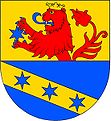Josefův Důl u Mladé Boleslavi
| Josefův Důl | ||||
|---|---|---|---|---|
|
||||
| Basic data | ||||
| State : |
|
|||
| Region : | Středočeský kraj | |||
| District : | Mladá Boleslav | |||
| Area : | 66 ha | |||
| Geographic location : | 50 ° 27 ' N , 14 ° 54' E | |||
| Height: | 215 m nm | |||
| Residents : | 452 (Jan. 1, 2019) | |||
| Postal code : | 293 07 | |||
| License plate : | S. | |||
| traffic | ||||
| Street: | Debř - Josefův Důl | |||
| structure | ||||
| Status: | local community | |||
| Districts: | 1 | |||
| administration | ||||
| Mayor : | Otomar Pohl (as of 2019) | |||
| Address: | Josefův Důl 6 293 07 Josefův Důl u Mladé Boleslavi |
|||
| Municipality number: | 529613 | |||
| Website : | www.obec-josefuvdul.cz | |||
Josefův Důl (German Josephsthal ) is a municipality in Okres Mladá Boleslav , Czech Republic . The place consists of a former textile factory with an attached workers' settlement. The company, founded in 1763, has been closed since 1999.
geography
The community is located five kilometers north of the center of Mladá Boleslav in a loop of the Jizera river . The river can be crossed here via a footbridge over the weir of a hydroelectric power station. The neighboring communities in the north are Bakov nad Jizerou and Bítouchov . The place is in the flood danger zone.
history
The small settlement originally belonged to the former Debř-Hrdlořezy municipality. The development into an independent place began in 1763, when a textile factory was established on the site . However, the municipality only became independent in 1873. At that time, all land and buildings in the future municipality belonged to the textile company. In the course of the separation, the management had all buildings demolished except for two houses and the inn and began building a workers' settlement . The place was predominantly inhabited by German-speaking textile workers, but the Czech František Jeník was elected mayor in the first municipal election.
The new community was called Josefodol, a derivative of the German name Josephsthal. In 1924 the name was changed to Josefův Důl due to an official directive. In 1974 the place was incorporated and the factory with the workers' colony belonged to the periphery of the district capital Mladá Boleslav. The municipality has been independent again since a referendum in 1992.
Textile manufacture Leitenberger
The company, which was founded in 1763 by Count Bolza (1719–1782), the owner of the Kosmanos lordship , was one of the first textile manufacturers in Bohemia . It grew rapidly in the beginning and soon employed 400 weavers . However, around 20 years after it was founded, it ran into financial difficulties. Around 1780 operations had to be restricted and in 1793 Count Bolza's widow sold the manufacture to the trained master dyer and industrialist Johann Josef Leitenberger .
Leitenberger already owned two textile factories in Verneřice and Zákupy and passed the management in Josefův Důl to his son Franz. In the following years Franz Leitenberger and his partner, the chemist Ignaz von Orlando, modernized the production, acquired new machines from England and built them in the village one of the largest textile manufacturers in the country, which soon became internationally active. The success was mainly due to the continental dam, which kept British competition away from mainland Europe until 1814. In this way, the Leitenberg company was able to gain a foothold in foreign markets.
After Franz's death in 1825, the sons Friedrich, Franz and daughter Johanna took over the inheritance. By 1852, Friedrich Leitenberger concentrated almost all of the family company's production facilities in Josefův Důl and continued the expansion course. Among other things, he had Austria's first four-color printing machine installed. In 1860, under the direction of Friedrich's son Friedrich Franz Josef Leitenberger, more than 13 million meters of fabric were produced; by 1880 there were already 17 million. 1867 Friedrich von Leitenberger sold the plant in Kosmanos and built a new cotton spinning and weaving mill in Görsdorf . At the end of the 19th century, the plant employed over 2000 workers and was the largest of its kind in Central Europe.
In 1899, Friedrich Leitenberger, an enthusiastic automobile racing driver, inherited the company in the fifth generation. He died in a car accident in 1904 at the age of 42. Since he did not leave any male descendants, the textile factory was converted into the Cosmanos joint stock company in 1905, and the Wiener Kreditbank became the largest shareholder. The upswing continued until World War I , when financial problems arose and the company fell into crisis. Production continued anyway, with a two-year break during the Great Depression . During the Second World War the factory worked for the German war economy. In 1946 it was nationalized and merged into the new national company TIBA, np, Dvůr Králové nad Labem . After 1989 efforts were made to privatize the plant, but this did not succeed. Operations ceased on August 31, 1999 after 236 years.
Attractions
The crypt of the Leitenberger family is located in the village. The palace, built in the pseudo-Renaissance style in 1860 and located in the middle of a park, was formerly the family seat of the Leitenbergers and was later used for community purposes. It is dilapidated and not freely accessible.
Individual evidence
- ↑ http://www.uir.cz/obec/529613/Josefuv-Dul
- ↑ Český statistický úřad - The population of the Czech municipalities as of January 1, 2019 (PDF; 7.4 MiB)
Web links
- Information about the castle (Czech)
- Article about the textile company (Czech) (accessed February 26, 2011)
- www.profit.cz

